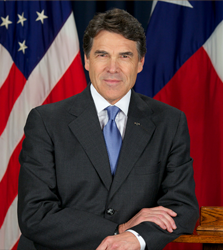
Perry Campaign Running on Empty
Late yesterday the news broke that the presidential campaign of former Texas Gov. Rick Perry has stopped paying its staff due to a lack of fundraising success. National Journal reports:
Rick Perry's Financial Implosion
Barely 60 days after declaring that he'd run for president, Rick Perry faces a financial crisis that threatens to short-circuit his comeback candidacy months before the election begins.
The longest-serving governor in Texas history is so cash poor that his presidential campaign has stopped paying its own advisers. National Journal first reported Monday that Perry had frozen pay for South Carolina staff, and CBS and the Washington Post soon reported the freeze applied all across the nation—including in Iowa, New Hampshire and his Austin headquarters….
Perry's campaign reported an anemic $1.1 million fundraising haul through the end of June and ended the quarter with $883,913 cash on hand….
Meanwhile, Perry was burning through what little cash he had raised—spending almost $593,000 in little more than five weeks in May and June. Nearly two-thirds of the money Perry spent ($391,000) went to Abstract Communications LLC, a business registered in Austin to Jeff Miller, Perry's campaign manager.
Perry’s campaign is hardly at an end, however, as the independent super PAC supporting his candidacy is flush with cash and can spend that promoting him. The New York Times explains:
But while Mr. Perry can no longer afford to compensate his relatively lean staff, “super PACs” supporting his candidacy are sitting on over $10 million. A group of pro-Perry super PACs raised $16.8 million through last month.
“Here are the facts: We have plenty of money to put him in position to finish in the top three or even win Iowa,” said Austin Barbour, a campaign strategist working for Mr. Perry’s super PACs.
Signaling that the groups were willing to pick up costs traditionally associated with campaigns, Mr. Barbour said: “We raised so much money we have the ability to support him in a number of ways. And we’ve been looking at all different ways to support him, not just paid media.”
Although the super PACs can do a lot to compensate for the official campaign’s inability to carry out certain functions, they are legally barred from coordinating their activities, and there are some things, like candidate appearances and media relations, that require the candidate to have campaign staff.
As the Times piece notes, Sen. John McCain came back from a similar collapse in fundraising in the summer of 2007, eventually winning the Republican nomination. And Sen. John Kerry was facing serious financial pressures at this time in 2003, before capturing the Democratic nod. Both of them did it in the era before super PACs, too, suggesting that Perry’s situation isn’t quite as dire as those two.
But Perry’s poor financial performance to date indicates real problems for his campaign, and it’s unlikely he can carry on even with super PAC support if he isn’t able to keep his official campaign office open.



